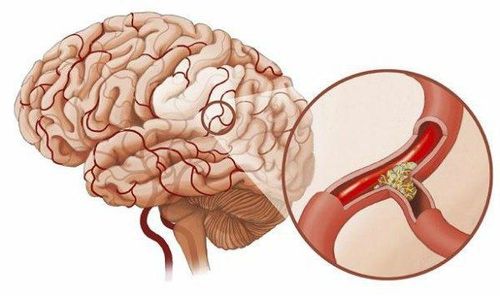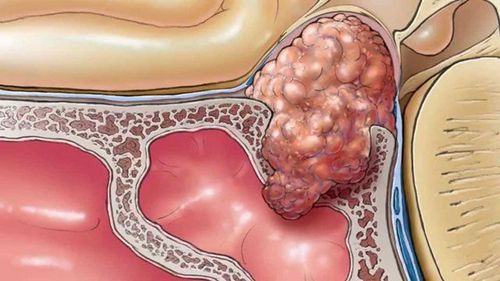This is an automatically translated article.
Graves disease eye complication is a common problem in people with overactive thyroid. This is an autoimmune disease caused by antibodies against receptors present in thyroid cells and also on the surface of cells at the back of the eye, causing protrusion.
1. Why is Grave's disease easy to cause complications?
Protrusion is the most common extrathyroidal manifestation of basedow's disease. However, this symptom may also be associated with other forms of thyroid dysfunction or may also occur in the absence of any biochemical thyroid dysfunction.
Graves' disease eye damage is an organ-specific idiopathic autoimmune disease. Although the pathogenesis of basedow's disease remains uncertain, several theories are related to an autoimmune response to thyroid-stimulating hormone (TSH) receptors, which are modulated by cells T-cell lymphocytes. This condition usually occurs during an autoimmune inflammatory response period lasting 6-24 months. In it, the connective tissue around the eyeball increases in volume due to increased permeability to chemicals mediating the inflammatory response. This is also the reason why the eyeball is pushed out, the optic nerve is compressed, and the muscles that move the eyeball are damaged.
An active inflammatory response phase will be followed by a fibrosis or “inactive” phase. At this time, the inflammatory response has turned chronic, the posterior ocular structures are deformed, the edema changes to fibrosis, and the lesions become chronic. Vision loss can occur, often when treatment is started at a delay.

Tình trạng mắt bị lồi do bệnh lý tuyến giáp basedow
2. Risk factors for eye complications basedow disease
Smoke. The habit of smoking, especially when it is ongoing, increases the risk of developing pterygium. This risk increases with the number of cigarettes smoked and decreases with quitting. Smoking also increases the risk of ophthalmic disease after taking radioactive iodine. Female gender. This may be due to the higher prevalence of thyroid disease in women. Middle-aged people. There are several genes involved including the HLA-DR3, HLA-B8 and the CTLA4 genes, the TSH receptor. Uncontrolled thyroid dysfunction. When the amount of thyroid hormone is not well controlled, bulging eyes will become more serious. Accordingly, tight control of thyroid function seems to reduce the severity of bulging basedow's disease. Treatment with radioactive iodine. This approach is associated with ophthalmic complications in the advanced stages of basedow's disease. Therefore, radioactive iodine can only be used in the inactive phase of bulging basedow disease.
3. What are the symptoms of Graves disease eye complications?
Symptoms of protrusion usually begin within 6 months of a diagnosis of basedow's disease. Very rarely, eye problems can develop long after thyroid disease has been treated. However, eye symptoms were completely unrelated to the severity of hyperthyroidism.
Symptoms of Graves' disease eye complications include:
Irritation or discomfort in the eyes Redness or inflammation of the conjunctivitis

Người bệnh sẽ cảm thấy một số triệu chứng bất thường tại mắt
Tears or excessive dryness of the eyes Swelling of the eyelids Sensitivity to light Sensitivity to moving the eyeballs bulging eyes Double vision When Graves' disease progresses to more severe eye complications, the patient may have impaired mobility eye and eyelid movement, incomplete closure of the eye with corneal ulceration, optic nerve compression, and loss of vision.
4. How to diagnose Grave's disease with eye complications?
If a person has been diagnosed with hyperthyroidism, a doctor can diagnose complicated eye disease basedow disease by examining the eyes and detecting signs of swelling and enlargement of the posterior eyeball structures.
In addition, facilities such as computed tomography or magnetic resonance imaging of the eye muscles may be helpful.
5. How to treat eye complications basedow disease
If a person has had complications from Graves' disease, the following treatments can help soothe the eyes and improve vision:Wear sunglasses. Once you have bulging basedow disease, your eyeballs are more susceptible to UV damage and more sensitive to sunlight. Accordingly, wearing sunglasses will help protect your eyes from both sun and wind.

Đeo kính râm bảo vệ mắt khỏi tia cực tìm của ánh sáng mặt trời
Use lubricating eye drops. Eye drops, like artificial tears, can help relieve dry and scratchy eyes. It is recommended to use it at bedtime to prevent the cornea from drying out as the eyelids may not cover the entire eye while sleeping. Raise the head of the bed when lying down. Keeping your head higher than the rest of your body can reduce swelling and may help reduce pressure on your eyes. Wear a prism. If the eyes are double vision, the patient needs to wear glasses that contain prisms that help the images to interfere with each other. Steroids. Postocular inflammation may be improved by steroid treatment (such as hydrocortisone or prednisone). Eyelid surgery. Because in basedow's disease, the eyelids are usually more open, some patients may have difficulty closing the eyelids, exposing the eyeball to the outside environment, causing tearing and excessive irritation. . Eyelid repositioning surgery may help reduce irritation. Eye muscle surgery. Sometimes scar tissue from a complication of Graves' disease can cause one or more of the eye muscles to become too short, and the doctor will need to lengthen the eye muscles to prevent double vision.
Surgery to decompress the optic nerve. When vision is threatened, doctors need surgery called optic nerve decompression. In it, the bone space between the eye socket and the sinus cavity will be removed to allow more space for the swollen tissue behind the eyeball. When the surgery is successful, the eye will improve vision and provide room for the eyeball to return to its normal position. All surgical interventions on the eye area should be performed in a qualified medical center with experienced doctors. At the same time, team coordination among experts will ensure the highest probability of success and minimize risks. However, the most important thing for ocular complications of Graves' disease is to always achieve the goal of good control of thyroid hormone levels maintained within the normal range and to be evaluated regularly.

Người bệnh basedow cần đến cơ sở y tế thăm khám và điều trị trong thời gian sớm nhất
6. How to prevent the disease basedow protrusion?
Graves' disease is often an associated complication that cannot be prevented.
However, because radioactive iodine therapy used to treat hyperthyroidism is more likely to aggravate bulging, this treatment should be avoided, especially in patients with moderate or severe protrusions. heavy. In cases where treatment with radioactive iodine is still needed, a prophylactic use of corticosteroids (prednisone) at the time of treatment, tapering over several weeks can help prevent eye complications of Graves' disease.
Smokers are more prone to bulging eyes due to basedow's disease than non-smokers. Therefore, trying to quit smoking or avoiding exposure to secondhand smoke is also considered a preventive measure against eye complications basedow disease.
In summary, basedow's disease is a common complication if this disease is not detected early and adequately controlled. However, any invasive intervention in this area should be carefully considered to limit eye damage but avoid causing more serious complications.
For detailed advice, please come directly to Vinmec health system or register online HERE.













